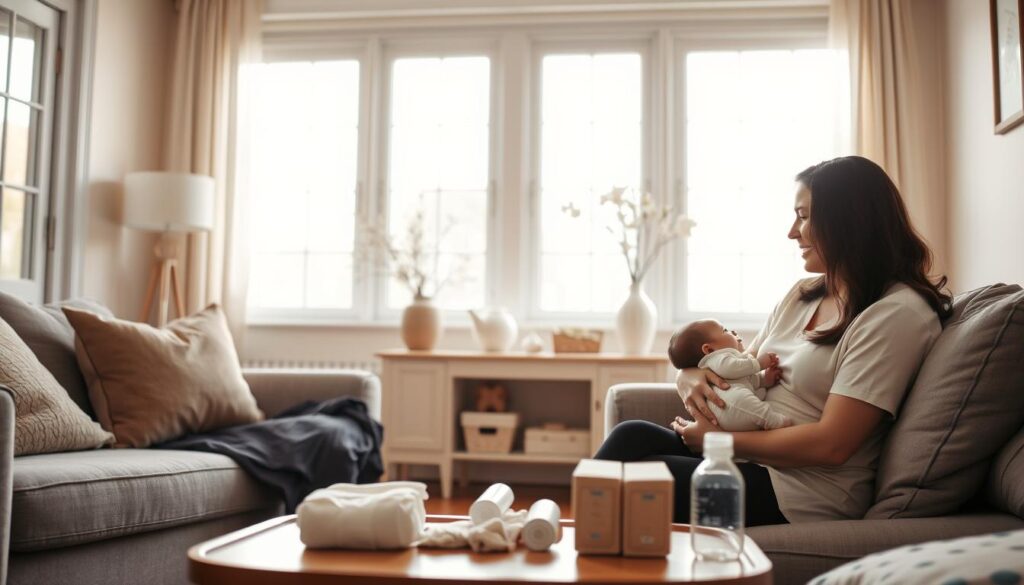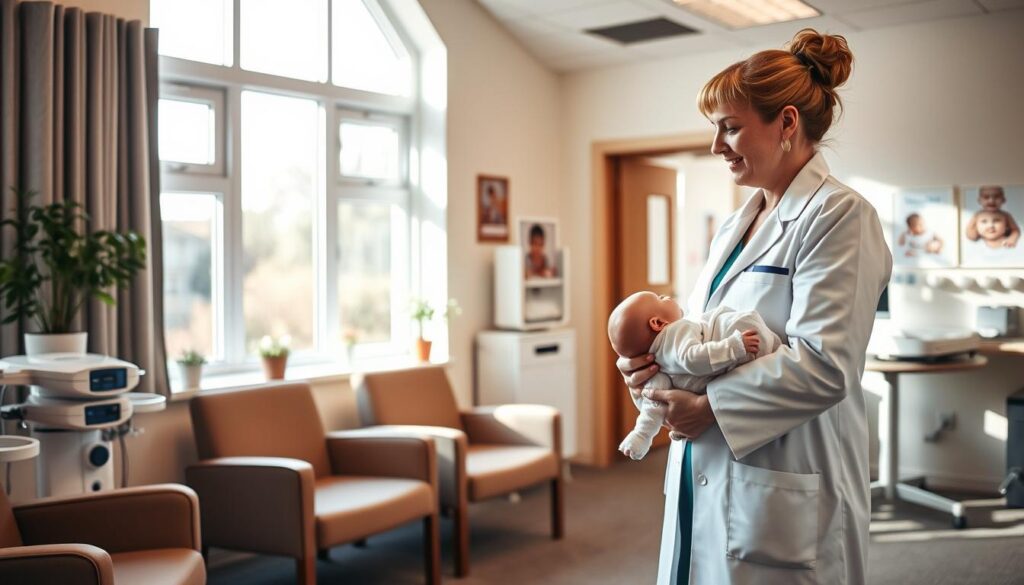Welcoming a new baby is a big change. The NHS support during the postnatal period is key for new mothers. The first six to eight weeks after birth are the postnatal period. It’s a time when care and support are essential for both mother and baby.

You can expect regular midwife visits and health visitor checks during this time. These visits help ensure your health and your baby’s. The NHS also offers breastfeeding support to help with any challenges.
Mental health is a big priority too. There are many mental health resources for new mothers. Knowing what to expect and the support available can really help during this time.
Key Takeaways
- Regular midwife visits and health visitor checks are provided by the NHS.
- Breastfeeding support is available to new mothers.
- Mental health resources are accessible for those who need them.
- The postnatal period is considered the first six to eight weeks after birth.
- NHS support is crucial for the health and wellbeing of both mother and baby.
The First 24-48 Hours: Immediate Postnatal Care
The first 24-48 hours after birth are crucial for new mothers and their babies. This is when immediate postnatal care begins. Both you and your baby will receive detailed care to start off healthy.
Hospital Care for Mother and Baby
After birth, you and your baby will stay on the postnatal ward. The healthcare team will watch over your recovery, looking for any issues and helping with pain. Your baby will get their first weigh-in, measurements, and vaccinations.
The midwives and nurses will also help with breastfeeding. They’ll assist you in getting a good latch and tackle any breastfeeding hurdles.
Initial Health Assessments
You and your baby will have initial health checks. For you, this means watching your bleeding, checking your blood pressure, and checking your overall health. Your baby will be checked for any signs of distress or infection, and their vital signs will be monitored.
These checks help healthcare professionals spot any potential problems early.
Preparing for Discharge
As discharge nears, the healthcare team will get you ready to go home. They’ll teach you how to care for your baby and manage your recovery. You’ll also learn about postnatal care and support services at home.
The table below shows what you’ll learn about discharge preparation.
| Aspect of Care | Information Provided |
| Baby Care | Guidance on feeding, bathing, and recognising signs of illness |
| Maternal Recovery | Advice on managing pain, bleeding, and physical recovery |
| Postnatal Support | Details on accessing midwife support, health visitors, and other community services |
By the time you leave, you’ll know how to care for yourself and your baby. You’ll also know how to get ongoing support.
Postnatal Care in the UK: What Happens After You Give Birth?
The UK’s NHS offers a detailed postnatal care plan for new mothers. This plan aims to give you the care and support you need after having a baby.
The NHS Postnatal Care Pathway
The NHS postnatal care pathway includes many healthcare experts like midwives and health visitors. It’s designed to meet your specific needs, ensuring you and your baby get the right support.
You’ll get to see various healthcare services during this time. This includes visits from midwives and health visitors. These services help check on your health and your baby’s, both physically and emotionally.
Your Rights and Entitlements
In the UK, new mothers have certain rights and benefits. You have the right to be treated with dignity and respect. You also get care that fits your unique needs.
You’re entitled to care from midwives and health visitors. You also have the right to make choices about your care. You should get information about your treatment and support options.
| Service | Description | Duration |
| Midwife Visits | Support with physical and emotional recovery, baby care, and breastfeeding | Typically up to 10-14 days postnatal |
| Health Visitor Checks | Monitoring of baby’s health and development, support with parenting | Ongoing, starting from around 2 weeks postnatal |
Typical Timeline of Postnatal Support
The support timeline can change based on your needs. Usually, you’ll get midwife visits for 10-14 days after birth. Then, a health visitor will take over, supporting you and your baby.
Knowing about the NHS postnatal care pathway and your rights can help you use the support services well. By understanding what to expect, you can get the most from the care and support during this time.
Midwife Support and Home Visits
Midwife support is a cornerstone of postnatal care, offering new mothers guidance and reassurance during the early days at home. You’ll typically receive home visits from a midwife for around 10 days after giving birth. This can vary depending on your individual needs and circumstances.

What to Expect from Midwife Visits
During these visits, your midwife will check on your physical recovery. They’ll also guide you on caring for your baby and offer emotional support. They’ll monitor your baby’s health and development, looking for any signs of potential issues.
Physical Recovery Checks for Mothers
Your midwife will assess your physical recovery, checking for any complications or issues. This includes monitoring your bleeding, checking your stitches if you had a tear or episiotomy, and ensuring you’re healing properly.
Baby Health and Development Monitoring
The midwife will check your baby’s overall health, monitoring their weight and assessing their feeding. They’ll also check for any signs of jaundice or other potential health issues. They’ll ensure your baby is meeting expected milestones.
When to Contact Your Midwife Between Visits
If you have concerns or questions between midwife visits, it’s essential to know when to seek help. Contact your midwife if you experience heavy bleeding, severe pain, or signs of infection. Also, if you’re worried about your baby’s feeding, health, or overall well-being.
Understanding what to expect from midwife support and home visits can make you feel more confident and prepared. Don’t hesitate to reach out if you have any concerns – your midwife is there to support you.
Health Visitor Services and GP Check-ups
Health visitor services are key in your postnatal care journey. They start after your midwife support ends. These services offer ongoing support and guidance for you and your baby in the early days of parenthood.
Transitioning from Midwife to Health Visitor
The switch from midwife to health visitor usually happens around 10-14 days after birth. This time can vary based on your situation. Health visitors are experts who check your baby’s health, help with feeding and care, and offer emotional support.
The New Birth Visit
The first visit from your health visitor is the new birth visit, within the first two weeks. It’s a chance to talk about any concerns or questions you have about your baby’s care.
Scheduled Development Reviews
Health visitors do scheduled development reviews to track your baby’s growth and development. These reviews are key for spotting any early issues.
The 6-8 Week GP Check for Mother and Baby
At 6-8 weeks after birth, you and your baby will have a GP check-up. This check is important for checking your physical recovery and your baby’s health.
Immunisations and Health Screenings
Your health visitor will also help you with your baby’s immunisation schedule and health screenings. These are crucial for protecting your baby from serious diseases.

| Service | Description | Timeline |
| New Birth Visit | Initial visit to assess baby’s health and provide support | Within 2 weeks |
| Scheduled Development Reviews | Ongoing monitoring of baby’s growth and development | Regularly scheduled |
| 6-8 Week GP Check | Assessment of mother’s recovery and baby’s health | 6-8 weeks |
Understanding the role of health visitors and the support they offer is vital. Knowing what to expect can greatly improve your postnatal care experience.
Additional Support Services Available
The NHS and other groups offer extra help for new parents. They provide care for health and wellbeing of both mom and baby. This support is beyond the first few weeks after birth.
Breastfeeding Support and Resources
New mums can get help with breastfeeding through the NHS, which provides access to lactation consultants, clinics, and local support groups. For more guidance and resources, visit the NHS breastfeeding support page.
Mental Health Services for New Parents
Mental health is key for new parents. The NHS has services for this time. They know mental wellbeing is important.
Recognising Postnatal Depression and Anxiety
It’s vital to spot postnatal depression and anxiety. Signs include feeling overwhelmed, sad, and anxious for more than a few weeks. Awareness is the first step to getting help.
How to Access Mental Health Support
Parents can get mental health help by talking to their midwife or health visitor. GPs also help identify and manage mental health issues.
Parent Groups and Community Resources
Parent groups and resources are great for new parents. They offer a place to share, get support, and feel more confident. Local groups often have meetings and activities.
| Resource | Description | Access |
| Breastfeeding Support Groups | Guidance and community for breastfeeding mothers | Local Hospitals, Online |
| Mental Health Services | Specialist mental health support for new parents | NHS Referral, GP |
| Parenting Groups | Community and support for new parents | Local Community Centres, Online |
Digital Resources and NHS Apps
The NHS has digital tools and apps for new parents. These help track baby’s growth, feeding, and sleep. There are also online forums and information sites.
Specialist Support for Complex Needs
Parents with complex needs get special help. This includes advice from healthcare experts and access to specialized services.
Conclusion: Making the Most of Your Postnatal Care
Being a new parent in the UK means knowing about postnatal care. The NHS offers a lot of help, from the start to ongoing support. This includes health visitor services.
Midwife support, health visitor services, and GP check-ups are key. You’ll get regular visits, health checks, and tips on caring for your baby.
The NHS also has more to offer, like breastfeeding help, mental health services, and parent groups. Using these resources well can help your baby and you start off healthy.
To get help, just talk to your midwife, health visitor, or GP. You can also find digital resources and NHS apps for extra support.



